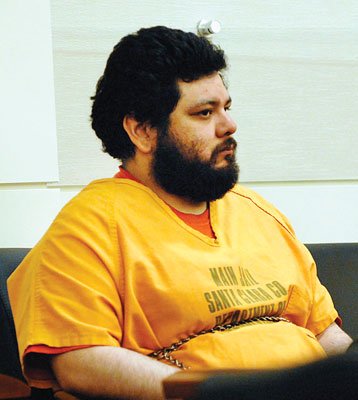County prosecutors are looking to subpoena medical records for
Pete Valdez III in the hopes of proving that the accused attempted
killer is mentally competent to stand trial.
County prosecutors are looking to subpoena medical records for Pete Valdez III in the hopes of proving that the accused attempted killer is mentally competent to stand trial.
Two court-ordered doctors found the man incompetent earlier this summer, and a jury will decide if Valdez should face charges of attempted murder and three other felonies later this year. To make sure the jury can decide whether Valdez has legitimate mental issues or started feigning them to avoid a life sentence at San Quentin State Prison, Santa Clara County Deputy District Attorney Cindy Hendrickson is requesting that the court subpoena medical and phone records from the defendant’s time in jail, she said. She also wants to gather anecdotes from Gilroy police officers and associates of Valdez who knew him before his November 2007 arrest.
“I’m not comfortable that the doctors had all the relevant information at the time they wrote their reports,” Hendrickson said Tuesday after Valdez’s postponed trial setting. “Valdez was competent until a short while ago, so is this a real breakdown or is he just under stress – as anybody would be – facing these charges?”
At issue is the timing of the defense’s request in May – after a judge ruled there was enough evidence for trial – that the court appoint a doctor to review Valdez’s mental state. To be legally incompetent, a defendant must not understand the nature of the criminal proceedings and must also be unable to rationally assist his or her attorney. This is different from simply choosing to not assist, Hendrickson said. From his November 2007 arrest until May, Valdez seemed to understand and aid just fine, Hendrickson said.
Valdez’s attorney, Berndt Ingo Brauer, is expected to point to the two reports and interview the physicians under oath. For now, the reports are off limits to the public per doctor-patient privileges, but state evidence code includes exceptions that can deny this privilege during certain criminal proceedings such as the competency hearing Valdez faces. Aside from the doctors possibly not having access to relevant medical information during their interviews with Valdez, Hendrickson said reviews typically take place in holding cells outside the court room and can sometimes last for as few as 15 minutes. It was unclear how long doctors took to interview Valdez or what documents they had access to.
A Santa Clara County Superior Court judge is expected to set a trial date Oct. 8. During the proceedings, the burden of proof will rest on the defense – not the prosecution, as it normally does – to prove that Valdez is incompetent. The jury will only decide on his competence and not whether he is guilty of any charges. A separate jury will decide the criminal matter only if the first jury finds the defendant mentally fit.
Hendrickson said Brauer cooperated with her requests. The defense attorney could not be reached for comment afterward and has generally declined to speak. So has Valdez’s father – former long-time Gilroy City Councilman Pete Valdez Jr. – who has attended every one of his son’s court appearances.
If the jury finds Valdez III incompetent, he will temporarily avoid trial. Rather than spending his life in prison – which would result if convicted of the alleged crimes because Valdez III has 10 prior convictions – he could spend up to three years at a state hospital in Atascadero. At the end of those three years – or if a mental health doctor discharges Valdez III prior to that – the defendant will have a hearing to see if he should face charges again. If, however, a defendant is still incompetent at the time of hearing, the case fizzles out more often than not, but the charges never fully disappear, said Hendrickson and Amy Cornell, public information officer for the District Attorney’s Office.
Valdez III charges stem from a pre-dawn incident Nov. 15, 2007. Gilroy Officer John Ballard noticed Valdez III bicycling without a headlight and tried to stop the portly man, according to court documents. Valdez III took off, ditched the bike a few blocks later and then fled on foot. Ballard caught up with Valdez III and tackled the suspect in a dark dirt lot near the intersection of Eighth and Church streets.
The two men struggled for a few moments before Valdez III took out a .25-caliber semiautomatic handgun loaded with seven hollow-point bullets, according to court documents. With his face in the dirt and Ballard – a 12-year officer – on top trying to restrain him, Valdez III pointed the gun at Ballard’s face and pulled the trigger multiple times, but the gun malfunctioned because two bullets clogged the chamber.
Eventually Ballard and a back-up officer cuffed Valdez III with the help of an electronic stun gun and several blows to the head, officers said. The defense has also raised questions about potential video footage of the incident, but police cameras were either absent or not working, and the city has experienced technical problems retrieving digital footage.













